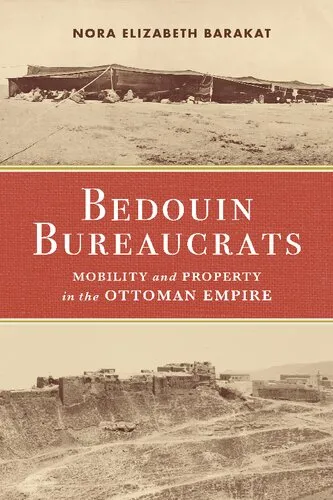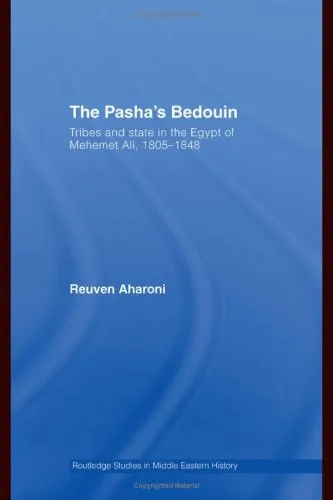Bedouin Bureaucrats: Mobility and Property in the Ottoman Empire
4.0
Reviews from our users

You Can Ask your questions from this book's AI after Login
Each download or ask from book AI costs 2 points. To earn more free points, please visit the Points Guide Page and complete some valuable actions.Related Refrences:
Welcome to the comprehensive introduction to Bedouin Bureaucrats: Mobility and Property in the Ottoman Empire, a groundbreaking book authored by Nora Barakat. In this work, I delve into the intersections of governance, mobility, land use, and property relations within the late Ottoman Empire, specifically focusing on Bedouin communities often overlooked in histories of the region. This book challenges conventional narratives that situate Bedouin societies merely on the margins of empires and states, presenting instead a nuanced picture of their engagement with Ottoman bureaucratic and legal systems.
Detailed Summary of the Book
Bedouin Bureaucrats explores the complex and dynamic relationship between nomadic Bedouin groups in the Ottoman Empire and the state apparatus they encountered during the late 19th and early 20th centuries. Drawing on rich archival sources, I examine how Bedouins engaged with imperial institutions, negotiated property claims, and navigated Ottoman governance structures. Far from the stereotypical image of ungovernable nomads disconnected from sedentary societies, Bedouins often operated as active participants in the Ottoman administrative system.
The book focuses on regions of the Ottoman Empire where mobility and fluid conceptions of property were particularly significant—principally in Greater Syria and the Arabian Peninsula. I consider the ways property rights extended beyond fixed land boundaries, integrating concepts of movement and resource sharing. By analyzing Ottoman court records, tax registers, and administrative reports, my research uncovers the ways Bedouin practices shaped and were reshaped by imperial power. Within these interactions, Bedouin groups both resisted and co-opted bureaucratic mechanisms to protect their grazing lands and preserve their way of life.
A key case study is the examination of property disputes and how Ottoman authorities adapted existing legal norms to address mobile populations. Another focus is on the technologies of governance—such as cadastral surveys or documentation practices—that mediated relations between the state and its nomadic subjects. Ultimately, the book reveals how the supposed binaries of sedentary versus nomadic and empire versus periphery were far more interconnected than previously imagined.
Key Takeaways
- Bedouins actively participated in Ottoman state structures and were not simply passive recipients of imperial policies.
- Concepts of property and mobility in the Ottoman Empire were deeply intertwined, challenging modern notions of static, bounded ownership.
- The Ottoman state tailored its bureaucratic practices to account for the realities of mobile populations, demonstrating a flexible governance style.
- Marginalized groups like the Bedouins played a central role in shaping the practices and policies of the Ottoman administration.
- The history of the Ottoman Empire cannot be fully understood without accounting for the interplay between nomadic and sedentary societies.
Famous Quotes from the Book
"To understand the Ottoman Empire’s system of governance, one must also understand how it moved with its people: its bureaucrats, its soldiers, its records, and its Bedouins."
"Property in mobility requires a view of land not as a bounded, sedentary space, but as a fluid and functional network connecting people, goods, and capital."
"The Bedouin world was not peripheral to empire; rather, it was integral to the Ottoman state’s visions of sovereignty, security, and survival."
Why This Book Matters
Bedouin Bureaucrats fills a critical gap in the historical scholarship on the late Ottoman Empire by centering the experiences of communities traditionally deemed peripheral or outside state governance. In doing so, it challenges entrenched assumptions about nomadic societies and their supposed incompatibility with bureaucratic systems. By shedding light on the ways Bedouins and Ottoman authorities negotiated power and property, the book expands our understanding of empire as a dynamic and negotiated process.
Additionally, the book offers a fresh analytical framework for approaching questions of mobility, property, and governance in other historical and geographical contexts. With its focus on legal pluralism, contested sovereignties, and the adaptability of bureaucratic systems, it speaks to broader themes of how empires and states incorporate diverse populations into their fold. It is an essential read for historians, anthropologists, and anyone interested in Middle Eastern studies, Ottoman history, or the broader dynamics of state control and mobility.
Free Direct Download
You Can Download this book after Login
Accessing books through legal platforms and public libraries not only supports the rights of authors and publishers but also contributes to the sustainability of reading culture. Before downloading, please take a moment to consider these options.
Find this book on other platforms:
WorldCat helps you find books in libraries worldwide.
See ratings, reviews, and discussions on Goodreads.
Find and buy rare or used books on AbeBooks.
1253
بازدید4.0
امتیاز50
نظر98%
رضایتReviews:
4.0
Based on 0 users review
"کیفیت چاپ عالی بود، خیلی راضیام"



